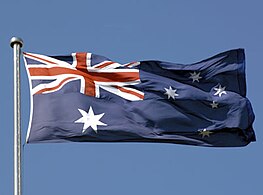
Australian nationalism is the ideology, movement and sentiment that emphasizes the identity, culture, and interests of Australia as a nation-state, asserting the identity of Australians as a distinct nation, regardless of its previously derivative and colonial status. It encompasses a range of beliefs and values that are often rooted in Australia's history, geography, and socio-political context. Key elements of Australian nationalism include a sense of national pride, attachment to Australian symbols such as the flag and national anthem, and a focus on promoting Australia's sovereignty and independence.
Historically, Australian nationalism emerged during the late 19th and early 20th centuries as Australia moved towards federation and gained independence from British colonial rule, developing itself in three pivotal historical traditions: the labour movement, the republican movement and the native-nationalist movement. It was shaped by factors such as the experiences of early settlers and the desire for a distinct Australian identity separate from British influence.
History
Main article: History of AustraliaPre-Federation
See also: Currency lads and lassesBy the early 19th century, Australia was governed as a series of six largely self-governing colonies that were spread across the continent and were part of the British Empire. The name Australia was popularised by explorer Matthew Flinders and first used officially by Governor Macquarie. Attempts to coordinate governance had failed in the 1860s due to a lack of popular support and lack of interest from the British government, but by the 1880s, and with the rise of nationalist movements in Europe, the efforts to establish a federation of the Australian colonies began to gather momentum. The British government supported federation as a means to cement British influence in the South Pacific.
Figures like William Wentworth, John Dunmore Lang and Banjo Patterson championed Australian identity during the colonial era.
Post-Federation
Nationalistic sentiments increased as a result of Australia's participation in the First and Second World Wars, with concepts such as "mateship" becoming a cornerstone of Australian nationalism.
See also
Flags
Flags used by Australian Nationalists
-
 Australian red ensign
Australian red ensign
-
 Older variations of the Australian flag
Older variations of the Australian flag
-
 Eureka Flag
Eureka Flag
-
 Australian federation flag
Australian federation flag
-
 "The Men From Snowy River" flag used during World War I snowball marches
"The Men From Snowy River" flag used during World War I snowball marches
References
Footnotes
- Knight 1995, p. 3: "Australian Nationalists assert that Australia is also a Nation regardless of our previously derivative and colonial status. The Australia Nation by its actions, creations, and expressions carries an Idea."
- ^ "Nationalism in Australia". Archived from the original on 1 September 2016. Retrieved 11 March 2016.
- "Surrendering nationalism". Griffith Review. Retrieved 11 March 2016.
- Christopher Scanlon (25 January 2014). "Australia Day: is nationalism really so bad?". The Conversation. Retrieved 11 March 2016.
- Hirst 2009.
- Saleam 2000.
- Pascale 2022.
- Crisp 1949.
- "Who Named Australia?". The Mail (Adelaide, South Australia). Adelaide: National Library of Australia. 11 February 1928. p. 16. Archived from the original on 17 April 2021. Retrieved 15 August 2024.
- Trainor 1994, p. 3-4.
- Trainor 1994, p. 4.
Sources
- Hirst, John (2009). Sense and Nonsense in Australian History. Black Incorporated. ISBN 9781921825408.
- Saleam, James (2000). Conservative Revolution, National Revolution And National Bolshevism Revisited: The Social Revolutionary Nature Of Australian Nationalism. Sydney: Australian Nationalist Ideological, Historical, and Legal Archive. Archived from the original on 20 November 2009.
- Pascale, Carmela (2022). History, Territory and Sovereignty: Celebrating Settler Nationalism in South Australia, 1900–1968 (PhD thesis). The University of Adelaide.
- Crisp, Leslie (1949). The Parliamentary Government of the Commonwealth of Australia. Adelaide: Longmans, Green & Co. Lotd. pp. 2.
- Trainor, Luke (1994). British Imperialism and Australian Nationalism: Manipulation, Conflict and Compromise in the Late Nineteenth Century. Cambridge University Press. ISBN 9780521436045.
- Knight, Brian (1995). Integral Nationalism: The Reborn Spirit of the Australian People. Melbourne: Radical Nationalism in Australia.
| Australia articles | |||||
|---|---|---|---|---|---|
| History |
| ||||
| Geography |
| ||||
| Politics |
| ||||
| Economy | |||||
| Society |
| ||||
| Politics of Australia | |
|---|---|
| Commonwealth | |
| State/territory governments | |
| Local government | |
| Political parties | |
| Political terminology |
|